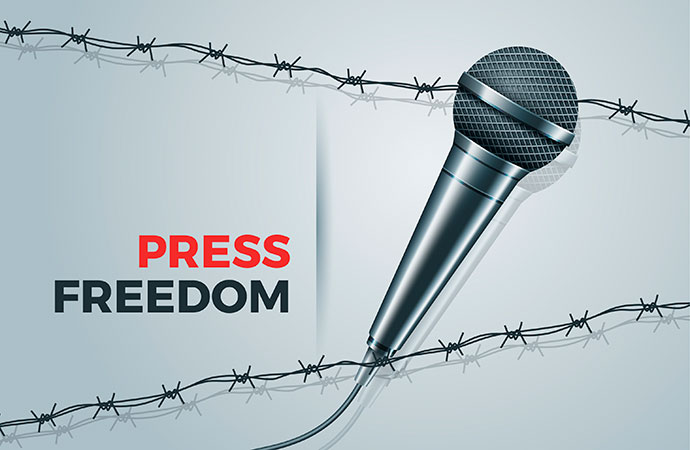Featured 1

Freepik
Having been ensconced in the country's media landscape in a variety of roles - from ownership to teaching to voracious consumption - the state of press freedom in Bangladesh at any one time, has been a pressing concern for me across six decades since independence.
Undoubtedly, what we witnessed during the last Awami League regime was unlike anything we had seen before, in terms of its cultivation of a media environment that not only shunned criticism of the Sheikh Hasina-led government; it actively trumpeted the government's achievements in shrill and exaggerated tones across dozens of platforms, many of whom were awarded their publishing or broadcasting licenses by Hasina. The idea behind it all was to allow newer and newer platforms to come up, but then to do so in such a controlled manner, by keeping it within a coterie, that would make sure the larger scheme was never exposed. Even as it worked as a large echo chamber that provided the validation for creeping authoritarianism, year after year.
With the fall of the regime, we saw the whole structure collapse in on itself. It was the most spectacular implosion of a regime or state structure in the last 50 years. And almost immediately, proclamations that the media had regained its freedom, that the dark days were over, started gaining currency. It certainly was a time for optimism. We looked at the make-up of the interim government, the preponderance of rights activists and advocates and defenders. It was all very heartening.
Yet six months later, if we were to ask ourselves that question (let's phrase it 'Is the media today free in Bangladesh?'), clearly we would have to admit that the reality has failed to live up to the initial expectation. The tables have turned decisively, and in order to survive the onslaught, we have seen some, indeed most, media houses perform the perfect backflip, so that now they would strike you as the biggest critics of AL and Hasina. And being able to talk freely about the previous regime's sins may lend the illusion of a newfound freedom - but we must not mistake it for anything more than that. The true test would lie in being able to speak freely about those in power today.
As far as that goes, we welcome and commend the repeated assurances from the chief adviser, that we don't have to fear the consequences of criticising his government, as well as the regular exhortations from the CA's press secretary, to point out the government's failures to them, so that they can course-correct. These are all welcome pronouncements, and I don't think anyone in the community is truly living in fear of the government coming after them with DSA or its successor act for that matter, for something they may have written.
And yet, some of us look at the frankly astonishing speed with which things went sour for a number of the Awami League-friendly journalists, and where life has brought them today - jailed in connection with murder cases, no chance of bail, and no lawyer to stand for them. In that moment, in that courtroom, in the eyes of that journalist we all are the Fascists. That is why I hope it is avoided as much as humanly possible.

























Leave a Comment
Recent Posts
Pedaling Through the Mangroves ...
The journey from the bustling streets of Barishal to the serene, emera ...
Why the Interim Government mus ...
Two weeks out from what is expected to be a red letter day in the figh ...
Doesn’t matter who thinks what about Bangladesh deci ..
The Other Lenin
US President Donald Trump said his administration
Govt moves to merge BIDA, BEZA, BEPZA, MIDA